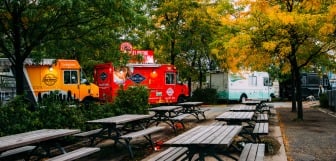Best Food Truck Locations - Ideal Spots for Your Food Truck
And yet, after you've made a thorough business plan, bought your van, and kitted out your kitchen, why is it you're not quite sure where to go next? Could it be that after getting everything else right, you haven't mapped out your route and scouted out the best locations to find customers?
Even with the best truck in town with the finest food on board, your food truck business relies on a route that provides exposure, regular customers, and dense populations that will consume your delicious food.
So how do you go about finding the right spots for your mobile restaurant? Let's dive in.
Food truck business locations: getting started
There are all kinds of different ways you can build your round up. There are also different sub-categories within the food truck business that could help you channel your energies toward building a route that suits your style of food truck.
For instance, the place you park your truck needs to be a passing point for people likely to suit the food on offer. Thinking about what that might be and targeting a selection of locations based around that is an excellent starting point for building up your round.
An example: parking your food truck by busy roads
Parking on the side of a busy road will suit travellers that need to stop off and pick up a snack, so a food trailer equipped with large numbers of sandwiches, crisps, sweets, and chocolates (as well as a variety of hot and cold beverages) is likely to do well.
In comparison, an ice cream truck will sell fewer items at the same location - simply because it sells lighter products, not well suited to eating while travelling. Serving hungry travellers means tidy snacks rather than sloppy sauces!
Successful food trucks choose their routes carefully by assessing what they're offering, and the kinds of passers-by they can attract that might be interested in that kind of menu. So, we've talked about busy roads, but what about other common locations for food trucks?
Find a compact point of sale that can travel with you
Before you find a location, you need a van and point of sale system that can keep up with your business!
Most food trucks will travel across a wide range of areas packed with hot and cold food and drinks. That means space on your truck comes at a premium. Even so, you need an efficient way of processing sales and taking payments.
Epos Now provides food truck POS software that works effectively on mobile, tablet, and any device with access to a web browser. Purchase the hardware that suits your needs. Plus, with Epos Now, all devices sync together, so our system will grow with you as you expand your business by adding more food trucks to your system.
Epos Now users can:
- Sell on the go at speed on the latest transaction software, with integrated card processing from Epos Now Payments
- Benefit from detailed reporting to adapt your pricing strategy, manage inventory, staff, and more
- Choose from hundreds of apps and integrable partner programs to run accounting, marketing, and other back-of-house functions in a way that suits you
- Manage your business stress-free with cloud technology that gives you instant access to the latest business data from anywhere in the world!
To find out more about Epos Now solutions, take a look at our food truck POS or reach out to speak with a member of our team.
The different kinds of food truck stops
Food truck owners face a rare challenge that other businesses don't. But once a round is well put together, it can provide a steady and stable income for many years. You may need to tailor the places you go to depending on a variety of factors, such as your target audience, how busy it is (depending on the time of day and day of the week), and opportunities that spring up like festivals. Let’s have a look at the kinds of locations best suited for your business.
Parks
Many a summer's day, people head out for a walk in a good mood. They reach the park to see food truck vendors offering ice cream, hot dogs, burgers, coffee, and any number of other pleasant fuels for the walk.
Parks are an excellent fit for food trucks, with large numbers of passing foot traffic, including people exercising or in good moods (two groups likely to want food or drink). No matter what you're selling, parks make a good option for a stop.
You might be thinking, what's the catch? I'll just head off to the nearest park and come back rich! The problem is that every park is a food truck park, so your competition will also be there. Try visiting your nearby parks and looking out for what the other food trucks do, when they arrive, how long they stay, and how many of them there are.
There are a number of approaches the industry takes to parks.Indeed, "food truck parks" have become an effective strategy. A group of trucks parking together, rather than diluting the number of diners, can attract more customers to the area and encourage more sales for everyone involved.
Alternatively, you can stake a claim to a time period when you park near an entrance or in the car park. As long as you respect the time when other trucks park there, they should do the same for you.
Business districts
A few years ago, every office in every city (and across the countryside) was chock-full of workers who'd been tied to their desks from 9 AM every day. While you might occasionally bump into an organised Oliver who meal prepped every day, those offices were providing successful food truck businesses with a captive customer base. Simply because you can drive and park near their offices, instead of them having to walk into a town or city to buy their lunch from a shop.
Covid-19 has led many businesses into a working from home (WFH) setup. Offices across the country, and the world, were suddenly empty, so a circuit of business parks, large office buildings, and employment hubs may not be as lucrative as they once were.
Nevertheless, seeking out large groups of people at work, from retailers to construction workers, and selling them lunch provides a solid foundation for a food truck revolution, starting mid-morning and ending mid-afternoon.
TOP TIP: We advise reaching out to businesses in advance and building a relationship with them where they agree to have you drop in at an expected time. Employers will need to allow their staff to step out to purchase from you, so it's important to build a strong communicative relationship with any businesses you cater to. (It also means you’ll have a contact number or email if they want to invite you to other events or times.)
Business districts will readily consume anything from pastries, sandwiches, salads, fast food, hot food, and a variety of non-alcoholic drinks.
Sports, music, festivals and special events
Some of the best food trucks focus their enterprise around big events with enormous numbers of people in attendance. At such events, a number of food trucks are commonplace, and charging higher prices for the convenience of getting food on your way in, out, or during the event means that food trucks can make fantastic profits in a short amount of time.
A summer of catering festivals, farmers' markets, and other outdoor events can therefore be enough to fund a food truck owner for an entire year, even if the off-season isn't nearly as profitable.
Given that the events are places people go to enjoy themselves, if you want to take your food truck out to these events to sell food, kit your truck out with some of the more indulgent, delicious dishes: burgers, hotdogs, and specialty cuisines. Pizza truck businesses are common at these events, and some are even able to sell single slices at near the price of a whole pizza.
Big events like sports events and music festivals attract large numbers of these businesses, but you'll need to quickly get in touch with organisers to get yourself a parking location to serve food. Be sure to stay on the lookout for these events, as competition can be fierce. But it's well worth a try, as these events can be extremely lucrative.
Petrol stations
A petrol station (or gas station, depending on your Atlantic disposition), like roadside stops, will see many drivers come and go bringing with them empty stomachs and thirsty mouths.
Depending on the station in question, they may be selling food themselves and won't want you on site. However, you may be able to come to an arrangement with the proprietor or could situate yourself nearby to benefit from the passing trade without imposing on the station itself.
Other parking spot ideas
In your search for hungry customers and successful locations to add to your round, it's well worth considering many different sorts of locations. Here are some other spots that food trucks pick for their rounds:
- University and college campuses. Large numbers of students and teachers coming and going, hungry from all that studying. It's a no-brainer!
- Nightclubs and bar hubs. If you're offering delicious, starchy snacks and you're willing to work night shifts, these areas could prove profitable as dancers leave venues looking to sober up with something quick to buy and tasty to eat.
- Shopping centres. Malls and shop quarters have a lot of competition, but huge demand for food as people tire out from shopping and need to refuel. There will be brick-and-mortar restaurant and dining hall businesses to compete with. Despite that, as with food truck parks, there is enough demand to go around.
- Residential buildings. If you live in an urban area, there are probably a few places you know of where large numbers of people live: high-rise apartment blocks, housing estates, and popular real estate spots, all with families living and eating together. Rural businesses can seek out towns and villages where many food trucks get reliable, regular trade.
What to think about when starting your business
Once you've scouted out a selection of locations you think have potential for your business, you'll need to piece them together in such a way you can get around to them all during your working week. But it's not just a matter of joining the dots. There are a number of factors to consider.
Martin Deltrice, of Norfolk-based Get Stuffed food trucks, was kind enough to explain how Get Stuffed built its customer base.
"You've got to call out beforehand. We go out with a leaflet, showing we have an assortment of food and telling people what time you'll arrive."
Get Stuffed has found reliability to be crucial to food truck success, and that takes a lot of work. Food trucks are hard-working vehicles, carrying extra weight, running coolers and heaters to maintain proper temperatures, and covering large distances every day.
Consequently, piecing together a round with lower mileage can help ease the pressure on your vehicle and can help you achieve the crucial reliability needed to create trust between customer and business.
Martin continues:
"Reliability, always being there at the same time and building up friendships and working relations. People buy from people they like. That's how we do it. They've got to know you'll be there every day, or else they'll bring their own lunch!"
"We have some more remote office-working customers. For them to get lunch, one of them needs to drive off and pick up [food] for everybody. We take the pressure off somebody having to go out and get [multiple] lunches." Martin of Get Stuffed adds: "Oh, and events and places where there are large quantities of people will naturally bring good sales."
Which spots prove themselves most lucrative?
So what are the key factors to consider when putting your round together?
- What will be the distance between stops and the overall mileage for your van?
- When does each stop have the most demand for food? (And how does this affect your shift patterns?)
- How long will it take you to get back to base to restock?
- How much leeway can you give yourself to make sure you offer customers reliability?
How to piece your round together
If reliability is such a key factor, you'll need to be organised and communicative when putting together your round.
You're going to depend on the regular custom from your stops, so contacting organisations near your stops can help get the word out about your arrival and put you on good terms with those customers you're going to rely on.
Office districts are easy. Reach out to the businesses and ascertain interest ahead of time so you know how much trade to expect. Residential areas tend to have community organisations, notice boards, and social media channels through which you can confirm when you'll be opening.
Contacting areas before arriving will give you a rough idea of how busy each spot might be and how much time you want to allocate to it. It will also help you prioritise, as going to a quiet spot with a full truckload of food will be a waste. But you can anticipate your best spots where you'll make the most sales and put them at the front of the round or just after restocking.
After your busier stops, you can get the most out of each round by visiting nearby quieter stops with lower stock loads, where this won't be as big of an issue. Creating efficiency while working around the needs of your customers will be difficult but will lead to the most profitable outcomes.
Our verdict: Big events in summer, reliable offices in winter
Summer brings out the crowds in huge numbers, and that creates fantastic opportunities for food trucks. However, the rest of the year, you'll need a reliable income to make running your van worthwhile.
Offices, parks, roadsides, and residences all make great stops where you can make a steady income. But no matter where you're going, regular traders like Get Stuffed will confirm that you need to communicate with your customers. Even roadsides see regular passers-by, and while people will still stop and buy from a food van when in need, they'll stop more frequently for a business they know and like.
The bottom line for food truck locations? Communicate, arrive on time, and bring your best food and drink!
If you enjoyed this blog, you may also like:





